Related Research Articles

Mozambique,officially the Republic of Mozambique,is a country located in southeastern Africa bordered by the Indian Ocean to the east,Tanzania to the north,Malawi and Zambia to the northwest,Zimbabwe to the west,and Eswatini and South Africa to the southwest. The sovereign state is separated from the Comoros,Mayotte and Madagascar by the Mozambique Channel to the east. The capital and largest city is Maputo.
Mozambique was a Portuguese colony,overseas province and later a member state of Portugal. It gained independence from Portugal in 1975.

Samora Moisés Machel was a Mozambican military commander and political leader. A socialist in the tradition of Marxism–Leninism,he served as the first President of Mozambique from the country's independence in 1975.

Joaquim Alberto Chissano is a politician who served as the second President of Mozambique,from 1986 to 2005. He is credited with transforming the war-torn country of Mozambique into a successful African democracy. After his presidency,Chissano became an elder statesman,envoy and diplomat for both his home country and the United Nations. Chissano also served as Chairperson of the African Union from 2003 to 2004.

FRELIMO is a democratic socialist political party in Mozambique. It is the dominant party in Mozambique and has won a majority of the seats in the Assembly of the Republic in every election since the country's first multi-party election in 1994.
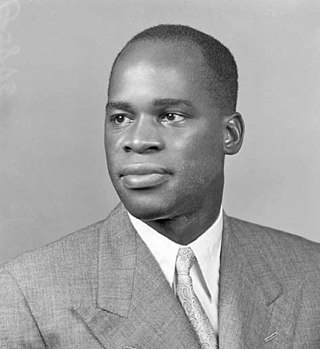
Eduardo Chivambo Mondlane was the President of the Mozambican Liberation Front (FRELIMO) from 1962,the year that FRELIMO was founded in Tanzania,until his assassination in 1969. Born in Mozambique,he was an anthropologist by profession,and worked as a history and sociology professor at Syracuse University before returning to Mozambique in 1963.

Armando Emílio Guebuza is a Mozambican politician who was the third President of Mozambique from 2005 to 2015.
Luís Bernardo Honwana is a Mozambican author and statesman.

The Mozambican Civil War was a civil war fought in Mozambique from 1977 to 1992. Like many regional African conflicts during the late twentieth century,the impetus for the Mozambican Civil War included local dynamics exacerbated greatly by the polarizing effects of Cold War politics. The war was fought between Mozambique's ruling Marxist Mozambique Liberation Front (FRELIMO),the anti-communist insurgent forces of the Mozambican National Resistance (RENAMO),and a number of smaller factions such as the PRM,UNAMO,COREMO,UNIPOMO,and FUMO.
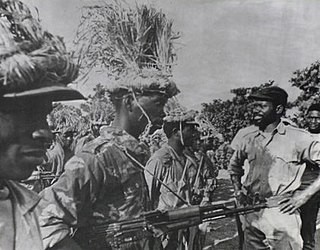
The Mozambican War of Independence was an armed conflict between the guerrilla forces of the Mozambique Liberation Front or FRELIMO and Portugal. The war officially started on September 25,1964,and ended with a ceasefire on September 8,1974,resulting in a negotiated independence in 1975.

Verónica Nataniel Macamo Dlhovo is a Mozambican politician who has served as the Minister of Foreign Affairs since 2020. She served as the President of the Assembly of the Republic of Mozambique from 2010 to 2020. Dlhovo is a member of Frelimo.
Alberto Joaquim Chipande is a Mozambican politician and a long-time leading member of FRELIMO. He was the first Defense Minister of Mozambique upon independence in 1975,remaining in that post until at least 1986 under President Samora Machel. Chipande was also a member of the Political Bureau of FRELIMO,which ran the government for 18 days in late 1986 after the death of Machel. He is also a FRELIMO member of the Assembly of the Republic from the Cabo Delgado Province.
Portuguese Mozambicans are Mozambican-born descendants of Portuguese settlers.
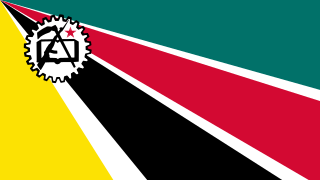
The People's Republic of Mozambique was a socialist state that existed in present day Mozambique from 1975 to 1990.

Uria Timoteo Simango was a Mozambican Presbyterian minister and prominent leader of the Mozambique Liberation Front (FRELIMO) during the liberation struggle against Portuguese colonial rule. His precise date of death is unknown as he was extrajudicially executed along with several other FRELIMO dissidents and his wife,Celina by the post-independence government of Samora Machel.
Ricardo Achiles Rangel was a Mozambican photojournalist and photographer.
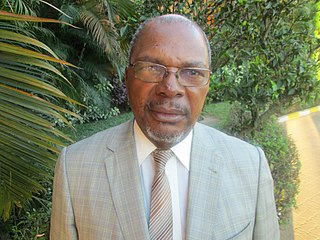
Teodato Mondim da Silva Hunguana is a Mozambican lawyer and politician who was the chairman of the boards of Telecomunicações de Moçambique and M-Cel.

Mozambique –South Africa relations refers to the bilateral relationship of Mozambique and South Africa. Governmental relations began in 1928,during the colonial era,when the Union of South Africa entered into formal agreements with the Portuguese Empire for the colony of Portuguese East Africa (Mozambique) in regard to labour,transport and commercial matters. Graça Machel,the inaugural First Lady of Mozambique from 1975 to 1986,later married the first post-Apartheid-era President of South Africa,Nelson Mandela,on July 18,1998,Mandela's 80th birthday. They remained married until Mandela's death on December 5,2013,at the age of 95. She was previously married to Mozambique's first president,Samora Machel,who died in a plane crash on October 19,1986,aged 53. Although South Africa is preponderant in the region in terms of economic resources and military might,Mozambique is considered a second-tier state in Southern Africa and a crucial partner for Pretoria.
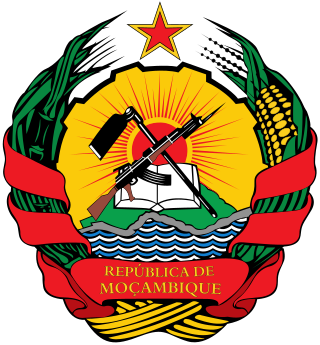
Mozambican nationality law is regulated by the Constitution of Mozambique,as amended;the Nationality Law and Nationality Regulation,and their revisions;and various international agreements to which the country is a signatory. These laws determine who is,or is eligible to be,a national of Mozambique. The legal means to acquire nationality,formal legal membership in a nation,differ from the domestic relationship of rights and obligations between a national and the nation,known as citizenship. Nationality describes the relationship of an individual to the state under international law,whereas citizenship is the domestic relationship of an individual within the nation. Mozambican nationality is typically obtained under the principle of jus soli,i.e. by birth in the territory,or jus sanguinis,i.e. by birth in Mozambique or abroad to parents with Mozambican nationality. It can be granted to persons with an affiliation to the country,or to a permanent resident who has lived in the country for a given period of time through naturalization.

Germany and Mozambique have maintained diplomatic relations since Mozambique's independence in 1975. Since then,numerous visits by German politicians and business commissions to Mozambique have followed,and a number of Mozambican politicians have visited the Federal Republic of Germany.
References
- ↑ Darch, Colin (2018). Historical Dictionary of Mozambique. Rowman & Littlefield. p. 57. ISBN 1538111357.
- ↑ Abrahamsson, H. (2003). Understanding World Order and Structural Change: Poverty, Conflict and the Global Arena. Springer. ISBN 1403944059.